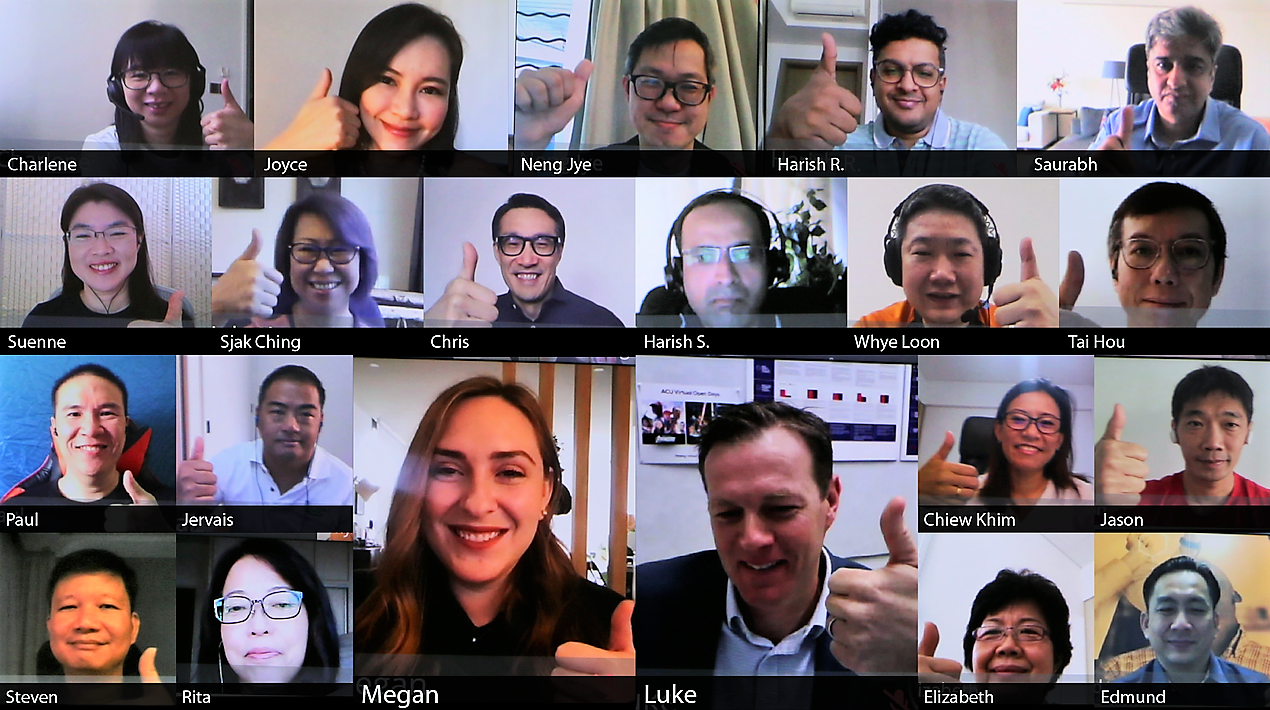
The impact of the disruption that COVID-has 19 brought on individual lives and communities is staggering. However, the crisis has also accelerated a move to the digital across the public sectors in an unprecedented way and has provided an opportunity for governments to transition services online. As citizens’ demand for services escalates, governments must rethink how to best serve citizens through proactive, transparent communication and citizen-centric digital offerings with always-on service.
Even as Singapore slowly starts to pivot from COVID-19 crisis management to recovery and reopening of the economy, international travel is unlikely to resume normally anytime soon. Simultaneously, consumer needs and behaviour have significantly changed during the period of contagion, self-isolation and economic uncertainty. Similarly, in their journey, governments have realised improving the citizen experiences online is the key to better critical outcomes such as increased trust, achievement of stated missions, meet or exceed budgetary goals, reduce risk, and boost employee morale.
Citizens’ preferences and behaviour are likely to keep changing consistently. Therefore, services need to be agile to accommodate their changing needs. Agencies must offer citizens far more accessible services in the most remote locations across multiple smart devices, 24×7 in the safety of their homes.
Faced with rapid and constant change, governments must inevitably undergo digital transformation to maximise citizen experiences by quickly and intuitively responding to the current trends, including streamlining content management, personalisation and relevancy, as well as mobile and real-time interactions.
Digital transformation efforts can no only just deliver long-term savings and huge gains but must also deliver better citizen and workforce experiences. Enhancing citizen experiences through technology will help citizens settle in the post-pandemic era efficiently, returning a semblance of normalcy and rebooting the economy quickly.
This was the focal point of the OpenGovLive! Virtual Breakfast Insight held on 23 June 2021 – a closed-door, invitation-only, interactive session with Singapore’s top government agencies. Sponsored by Sitecore and Microsoft, the session aimed to provide the latest information on delivering an effective and efficient citizen experience.
OpenGovLive! Virtual Breakfast Insights are concise, to the point, strategic level discussions designed to bring learning to the highest level! The unique proposition of this OpenGov Breakfast Insight is the integration of cutting-edge insights from expert speakers and interactive discussion among the participants.
Finding Partners to Enhance Citizen Experience

To kickstart the session, Mohit Sagar, Group Managing Director and Editor-in-Chief at OpenGov Asia delivered the opening address.
While the adoption of different technologies significantly increased during the pandemic, the solutions cannot be termed digital transformation as organisations, for the most part, deployed band-aid technologies and ad-hoc platforms to stay afloat.
Customers now have a wide variety of options in the private sector. A benchmark of personalised customer experience has been set by banks and retail outlets that utilise a plethora of cutting edge solutions. As a result, people have become even more demanding about what they want and have expectations of how it should be provided.
For citizen services, the government is the only option for the community. So as people and businesses start to embrace technology at an unprecedented level, governments, too, need to level up their efforts to meet citizens’ high expectations of personalised and convenient digital services.
Mohit emphasised the importance of partnership in creating the best citizen experience. Finding the right partners is paramount in improving digital offerings in the new norm. Having competent partners is keys to drive positive, effective and sustainable change – both in the short and the long term.
Governments must be willing to learn from experts in the private sector. Organisations like Sitecore and Microsoft have a solid track record of creating engaging and personalised customer and citizens experience. They have the capability to guide public sector agencies in their digital transformation journies. Having the right partners who can focus on the design, implementation and management of the transformation strategy, allows agencies to focus on their main tasks and key deliverables.
Transforming Citizen Experience

The delegates next heard from Megan Engard, Digital Strategist, Business Value and Strategy Team at Sitecore who discussed how to create meaningful connections with citizens by amplifying the impact of digital experiences.
The adoption of digital business models was driven by the need to switch to digital-only engagement – not only to survive in the new normal but also to thrive. commercial enterprises allowed customers to see options, make their choices, pay and have the products delivered all from the comfort of their homes. In a word: ease-of-business. Post transformation research found that improving and investing in customer experience increased revenue by 19%.
Similarly, Megan feels, that transformation of the citizen experience is a radical transformation of the quality and nature of interactions that people have with their government.
Citizens are comfortable in making decisions based on digital-only engagement as offline engagements are increasingly no longer an option. But they expect the same level of experience from government agencies as they expect from companies. This trend forces agencies to be more experience-centric in their digital offerings.
Empowered customers want better customer experiences within their limited time. They demand content-rich and convenient options that allow for informed decision making, anytime, anywhere and across devices.
However, too many tools and services can cause digital fatigue. Digital executives should put in extra effort to create menus and solutions that are simple, intuitive and clear. Additionally, it is essential that agencies collaborate with one another so citizens don’t get lost in a maze of departments and siloed bureaucracy. The result of focusing on citizen needs is experience-effectiveness and experience-efficiency.
While the expectations from citizens are the same for public or private sectors, the journey for governments is far different than the of businesses. There are three fundamental considerations in enhancing the citizen experience:
- Data governance: Collect experience data in the context of interactions, enable the ability to track user behaviour and integrate with third-party data systems and protect data with security.
- Personalise the citizen experience: Personalise customer experience-based campaigns, personas, profiles, interactions, behaviour and more to provide personalised content.
- Campaign and marketing automation: Drag and drop forms and marketing automation streamline time to market and engage citizens.
Megan emphasised the importance of citizen experience, engagement and access for government agencies. Focusing on the citizen and making their experience easy, efficient and effective will hugely impact agencies ability to deliver on their mandate.
International Case Study
 The next speaker Luke Williams, Associate Director, Digital Experience at Australian Catholic University, elaborated on case studies in digital strategy in enhancing user experiences from his university.
The next speaker Luke Williams, Associate Director, Digital Experience at Australian Catholic University, elaborated on case studies in digital strategy in enhancing user experiences from his university.
The Australian Catholic University (ACU) consistently strives to give a voice to those who are not listened to. Integral to their digital vision is to make sure that everyone who wants to voice an opinion or ask a question is heard. Every student should be known and the university should be able to engage with them in a tailored experience.
From a brand perspective, ACU has several challenges to overcome in its goal to provide a personalised digital experience for students. For Luke, personalisation is a pragmatic essential. Tailoring courses and their content to prospective students is critical for a positive experience and ideal educational outcomes.
Prior to the pandemic, ACU had rolled out a digital strategy on Sitecore. Their goal was to integrate user experience research and design process to understand what their customers – students – needed.
They consolidated 15,000 pages into 1,500 pages of rewritten content and then re-platformed onto Sitecore 9 (eventually upgrading to Sitecore 10), a new setup on Azure infrastructure.
During their implementation of digital strategy, ACU has focused on:
- Implementing analytics
- Establishing audience profiles
- Tagging all content
- Implementing conversion goals
- Integrating Dynamics 365 CRM
- Adding Sitecore tracking to other systems
The results of this strategy – a combination of personalised approach improved user experience, more relevant content and stronger calls to action – were a 99% increase in lead generation and a 14% growth in commenced applications. Student engagement experienced a 207% growth to ACU focused areas of the site and visits to research content were up by 198%. There is significantly less ‘administrative’ traffic and more ‘prospective student’ traffic.
Due to the COVID-19 pandemic, ACU could not run physical Open Days – a vital part of their student recruitment activity. They used their well-established customer experience process and in-house team to co-designed a Virtual Open Day with students and staff.
Luke acknowledged that the results of the digital strategy were excellent – not only because of the tech but also their focus. In closing, Luke strongly encouraged delegates to make customers – citizens or students – a priority.
Interactive Discussion
After the informative presentations, delegates participated in interactive discussions facilitated by polling questions. This activity is designed to provide live-audience interaction, promote engagement, hear real-life experiences and impart professional learning and development for participants.
The first question asked whether the pandemic created the need to change or redefine the citizen experience provided by agencies. All the delegates agreed that their agencies had to make adjustments to their citizen experience. Megan concurred with the participants and cited the increased demand for QR code in many agencies as an example of the change in citizen experience.
The next query was on the key priority in delegates’ agency in creating a more citizen-centric customer journey in the recovery phase. Almost half (44%) prioritised delivering a connected omnichannel experience. A little over a third (38%) chose creating a more personalised experience as their main priority. A little less than a fifth (18%) focused on the ease of experience driven by mobile-first experiences.
When asked about which aspect is a critical outcome their agency would most like to achieve by enhancing the citizen customer journey, more than half (56%) focused on achieving an agency’s stated missions with increased citizens’ confidence. A quarter (25%) chose boosting their agency’s employee morale and long-term organisational success with an enhanced citizen experience. A little less than a fifth (19%) agreed that increasing citizen’s trust is the most critical outcome.
On the issue of the biggest internal challenge that an agency faces in trying to achieve an enhanced citizen experience, almost half (46%) agreed that lack of the skill sets is their main challenge. For The remaining delegates were equally divided between the inability of existing digital solutions to support their agency’s needs (23%) and data and security concerns (23%) as their primary challenge. Only 8% chose a lack of the budget to leverage digital solutions as their biggest challenge.
Asked if their agency had moved to the Government Commercial Cloud (GCC), 50% said yes. All the others were evenly split between planning to migrate immediately (14%), planning to migrate sometime soon (14%) and are not sure when to migrate (14%). The remaining 8% indicated that their agency did not have any plans for cloud migration.
The last question inquired about the biggest challenge in the move towards GCC. A third (33%) voted that their main hurdle was a lack of knowledge on the solution providers and options that would best match the agency’s needs. An equal number of delegates cited security concerns (25%) and government concerns (25%) as their biggest issue. Less than a fifth (17%) chose lack of skills set to migrate as their biggest obstacle.
Conclusion
The Virtual Breakfast Insight ended with the remarks from Megan. In closing, Megan emphasised the five key transformational trends in government – personalising the citizen experience, AI-augmented government, cloud as an innovative driver, data governance and streamlining content production.
Agencies must invest in key capabilities to improve digital maturity in four key areas: a holistic view of the citizen, data-driven, integrated omnichannel interactions, content creation
and approval efficiency and velocity, and increased capacity with cost efficiencies. These four capabilities are driven by investment in robust experience data, scale through intelligence, strong content and personalisation solution and omnichannel experience delivery.
Before bringing the session to an end, Megan thanked everyone for their active participation and the key insights shared. She encouraged the delegates to exchange ideas and gain more information about citizen experience.
















